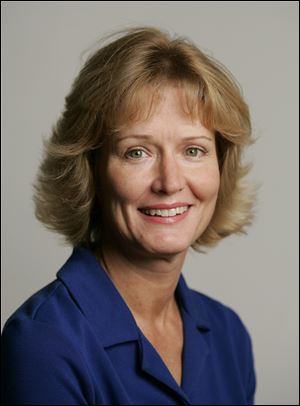
COMMENTARY
Time for a conversation about Common Core
12/7/2013
Marilou Johanek
The country is clueless about the biggest story to hit public education in decades. Common Core state standards, involving all but four states in the nation, are dramatically reshaping what is taught and tested in public schools.
States developed common math and English standards, to expand depth of learning and establish uniform educational goals. Many Ohio districts have begun executing the new standards.
Yet while this monumental shift in educational aspirations and assessments was occurring in schools across the country, a poll found that almost two out of three Americans had never heard of Common Core.
Sixty-two percent of respondents in an annual survey by Phi Delta Kappa — an association of education professionals — and Gallup on public education didn’t know anything about the new academic standards, or new online testing, being put into practice in classrooms.
Advocates who crafted a sea change in education overlooked a critical component of reform: public awareness. The void of information about Common Core has been filled with misconceptions, half-truths, and in states such as Indiana, Michigan — and now Ohio — legislative efforts to stop the standards or reject new standardized testing.
Pending legislation in Columbus would derail Common Core. State Rep. Andy Thompson (R., Marietta) introduced the bill, recently adopted by the House Education Committee.
He believes Common Core was rushed into effect without enough legislative vetting to address what he calls a “one-size-fits-all education dictated by federal and corporate dollars.” Mr. Thompson echoes arguments on conservative talk shows that the new standards are the brainchild of the federal government as it schemes for greater control of local education.
“They [U.S. Education Department officials] may have enlisted some people to write the standards and may have enlisted people to support them,” Mr. Thompson said, “but pretty much [Common Core] is a Washington, D.C., plan to come up with one set of federal standards implemented across the states with Washington in the driver’s seat.”
That’s half true. Common Core was a collaborative effort of professionals from education, business, and other fields organized by governors and state school chiefs. But a federal carrot-and-stick approach involving money made it happen.
When implementation started this school year, the public was in the dark, Mr. Thompson told me. “Today, teachers, parents, school board members, and, in some cases, [state] representatives, are hearing lots of complaints about the new set of standards,” he said.
“Between the standards and the mandatory assessments, produced with federal dollars out of Washington, you have a vise into which curriculum must fit,” Mr. Thompson said. “Teachers are going to be evaluated on their ability to teach to the standards.
“It’s how they’ll be assessed, paid, rewarded. Why would they bother teaching anything but to the standards and to the test?”
It’s a valid point. The tests undoubtedly will drive the curriculum.
Proponents argue the new standards are more rigorous than those that have been used in Ohio before, and emphasize critical thinking instead of rote learning. But Mr. Thompson defers to the “standards experts” who testified before the education committee about what he call the dubious pedagogical value of Common Core.
Mr. Thompson’s bill would repeal the standards, prohibit the state Board of Education from using assessments based on the standards, and outlaw data collection on students except for limited administrative purposes.
Mr. Thompson faces an uphill battle against influential Common Core supporters, from his committee chairman to Gov. John Kasich and powerful education and business backers, who are committed to seeing the reforms through.
But I wish him luck. Not because Common Core should be scratched. Not because private money — from the Gates Foundation — funded development of the “voluntary” standards, and federal dollars lured states, including Ohio, to adopt them.
I wish him luck because the public can’t remain clueless about the money, motives, and merit behind Common Core. Student learning hangs in the balance.
“The discussion should be around what are the basic understandings that all American kids should have,” Kathleen Scott, an education professor at Ashland University, concluded, “regardless of where they live and/or how mobile their family is, and what, if any, is the role of the federal government in that.”
She’s right. Let the conversation commence.
Contact Blade columnist Marilou Johanek at: mjohanek@theblade.com